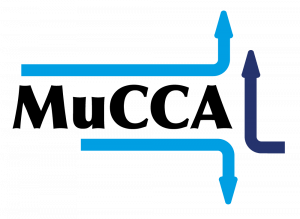Frequently Asked Questions
What is MuCCA?
The Multi-Car Collision Avoidance (MuCCA) Project is a £4.6m, 30-month project supported by Innovate UK, which will develop a next-generation driver aid that aims to avoid multi-car collisions on motorways. If an accident cannot be avoided, the MuCCA system will attempt to minimise its consequences (both injuries and damage).
These goals mean the project will implement, test and refine solutions to many of the technical challenges that face fully autonomous cars. These challenges include sensor systems, machine learning, vehicle-to-vehicle communications and vehicle control systems.
What are the project’s aims?
The aim of this project is to develop a next-generation driver aid that aims to avoid multi-car collisions on motorways.
In addition, MuCCA looks to establish a range of different activities:
- Bringing together a diverse group of partners, with world class expertise
- Considering the complete connected and autonomous vehicle ecosystem (eg. Cyber security, testing, safety case)
- Developing an L4 Automated Cooperative Multi-Car Collision Avoidance system
- Focusing on reducing motorway collisions
- Applying advanced telecommunications and information processing capacity to improve road safety, accident reduction, and accident severity reduction
- Bringing global industry to the UK and building on an industrial supply base.
Which organisations are part of MuCCA and what are their roles/contribution to the project?
- IDIADA (Lead Partner/Project Manager): IDIADA’s main technical responsibilities are the implementation of the electronic systems and software in the vehicle, and development of the simulation test environment. As lead partner IDIADA contributes in at least a supporting capacity to all work-packages and coordinates the project overall.
- Cranfield University: Cranfield is developing novel algorithms for the MuCCA system in the areas of decision making, and also modelling of human driver behaviour.
- Westfield Sportscars: Westfield is developing and supplying the test vehicles for the MuCCA trials, utilising its GTM sportscar. Westfield is responsible for the MUCCA system trials, including hire of an appropriate facility, test planning, operational risk assessment and managing the tests themselves.
- SBD: SBD is carrying out a cybersecurity analysis of the proposed MuCCA framework to avoid security threats.
- Cosworth: Cosworth is developing and implementing a data recorder to ensure that all key parameters are logged before, during and after any event where the MUCCA system is activated, and providing input into the sensing system and interpretation.
- Transport Systems Catapult: In addition to its role in dissemination, TSC is responsible for the overall system definition, including defining use cases, system requirements and architecture. It is also carrying out ethical and safety analyses. TSC is also using its expertise in systems engineering, modelling and safety analysis to support other consortium partners in their activities.
How will the MuCCA collision avoidance system work?
MuCCA-equipped vehicles will keep an up-to-date picture of the speeds and positions of the surrounding vehicles, and share this with the vehicles around it using wireless communication technology, both extending and improving the information. Vehicles will use a sophisticated array of sensors including lidars (scanning laser range-finders) and cameras to build this picture.
When the MuCCA system predicts a collision is likely, it will coordinate with surrounding connected cars to plan paths for each vehicle to avoid the collision. This joint planning allows cars to proactively make space for others, and minimises the consequences of any incident. The system can even predict paths for vehicles driven by humans, using a driver model developed during the project to apply in imminent collision situations.
Using advanced control systems, each vehicle will then follow its path to safely negotiate the incident, before finally handing back control to the human driver once the danger is past.
What vehicles will be involved?
We will be using passenger vehicles (M1 classification), provided by Westfield. Up to five cars will be take part in the trials at the end of the project.
Will MuCCA technology be fitted in all cars?
MuCCA is a research and development project that will develop and prove the MuCCA collision avoidance technology. As part of the project, the technology will be fitted to five Westfield cars and tested on a test track – it will not be tested on public roads. The project partners are committed to commercialising the technology, which could potentially be fitted to new vehicles or even retrofitted to some cars. Before this happens, further development and testing will be necessary post-project. Timing of this will also depend on resolution of some the broader issues relating to roll out of autonomous vehicles, such as legal frameworks, insurance, security and public acceptance.
Does MuCCA still work if some or all of the other vehicles involved are not MuCCA-equipped?
Yes, because the system can predict the likely paths of these vehicles, and plan a path which avoids colliding with them. MuCCA is also an advance on current driver-assist systems because it controls both the steering and braking of a vehicle, giving more options for avoiding incidents.
Will the vehicles be used on public roads?
No, all testing and trials of the system will take place on private tracks, although a range of guests will be invited to witness a final demonstration of the technology.
How fast will the vehicles travel?
As the focus of this project is motorway collision avoidance, it is expected that the cars will be travelling at motorway speed in the trials – up to 70mph.
What are the main “milestones” for the project and what information will be made public?
MuCCA began in August 2017, and will conclude early 2020. There will be several major milestones throughout the project, as the system designs are finalised, tested in a ‘virtual environment’, test vehicles built and finally tested on a test track in late 2019.
Key information and findings will be made available to the public both via the media and directly on the MuCCA website. In addition, we are planning to hold stakeholder workshops as well as distributing a free-subscription online newsletter. MuCCA consortium members will also be attending and speaking at major industry conferences on connected and autonomous vehicles and related topics.







